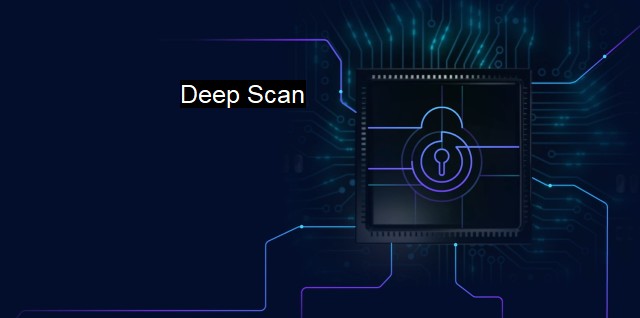What is Deep Scan?
The Importance of Deep Scan: Unveiling the Comprehensive yet Overlooked Tool of Cybersecurity and Antivirus Software
The term "Deep Scan" refers to a comprehensive and detailed scanning process performed by antivirus programs to identify and remove potential threats in a computer system. Deep Scan, also known as Full System Scan or In-Depth Scan, examines every bit of information on a system, not just the files that are in active use.The primary purpose of a Deep Scan is to locate any form of malicious software, colloquially known as malware, that may be hiding deep within the system. Malware could present as viruses, Trojans, worms, spyware, ransomware, adware, or any unauthenticated scripts or code that might lead to data theft, loss, or corruption.
The Deep Scan method became necessary right from the origin of the first destructive computer virus in the late 20th century. Early viruses were simplistic, primarily focusing on file, boot, and macro techniques, which were relatively easy to detect and clean. with advancements in technology and the exponential growth of the internet, malware techniques improved and diversified tremendously. Modern viruses can block antivirus programs, encrypt or hide themselves or even mimic ordinary files, making detection and elimination much more complicated.
So, when the routine 'quick scan' that checks frequently used files and programs isn't enough, the more extensive Deep Scan becomes an essential tool in the fight against modern malware. How? It examines every area within a system's storage drive. To achieve this, it uses signature-based detection, heuristic analysis, data mining techniques, and file emulation.
Signature-based detection involves cross-referencing database repositories of known virus signatures with the system’s files, while heuristic analysis looks for suspicious behaviours or file structures, using algorithms and rules derived from known traits of a virus. Data mining techniques gather characteristics from existing viruses to predict and conclude if a new breed is a threat. Lastly, file emulation runs a suspicious program or script in a secure, emulated environment to deduce whether it is malicious or harmless.
One downside of a Deep Scan is the amount of time and computing resources it consumes, thus somewhat slowing down system performances. It may take several hours, depending on the size and complexity of the data volume the system handles. Therefore, many users and administrators opt to run deep scans during off-hours or times of low activity.
a Deep Scan doesn't guarantee 100% malware detection due to the continuously evolving nature of cyber threats, making it impossible for antivirus vendors to update their threat signature databases in real-time. Regardless, this method remains an integral component of cybersecurity hygiene because it greatly contributes to maintaining a healthy system, complements other security mechanisms, and aids in the continual audit of a system's health.
In fact, many cybersecurity experts recommend not only running Deep Scans regularly but also enlisting additional security layers including firewalls, active monitoring tools, anti-spyware programs, and secure browsers. adopting a multi-vector proactive cybersecurity strategy, updating systems and applications regularly, and training users about safe online behaviours increase the chances of staying safe in the cyber realm.
The Deep Scan method provides a frontline defence against the diverse and pervasive cyber threats that exist today. Although it might be resource-consuming and time-intensive, it remains an important protocol for system protection. Above all, it complements other cybersecurity methods, ensuring a well-rounded and robust system defence, which gives users and business owners the peace of mind in an era where cyber threats continually evolve and escalate.

Deep Scan FAQs
What is a deep scan?
A deep scan is a comprehensive antivirus scan that thoroughly checks every corner of your computer's system for malware and other security threats. It scans all files, including hidden and system files, to detect and remove any malicious code that may be lurking on your system.How is deep scan different from quick scan?
A quick scan only checks the most commonly infected areas of your computer, like the system files and running processes, while a deep scan checks every file and folder on your computer's hard drive. A deep scan may take longer than a quick scan, but it provides a more in-depth analysis of your system's security.When should you run a deep scan?
A deep scan should be run on a regular basis, especially if you frequently download files or visit websites that are known to be high-risk. It's also a good idea to run a deep scan if you suspect that your computer may have been compromised or if your antivirus software detects a security threat that it can't immediately remove.How effective is deep scan in detecting and removing malware?
A deep scan is the most effective way to detect and remove malware from your computer. By scanning all files, including hidden and system files, it can detect and remove even the most deeply hidden malware that might be missed by a quick scan. However, it's important to keep your antivirus software up-to-date to ensure that it can detect and remove the latest types of malware.| | A | | | B | | | C | | | D | | | E | | | F | | | G | | | H | | | I | | | J | | | K | | | L | | | M | |
| | N | | | O | | | P | | | Q | | | R | | | S | | | T | | | U | | | V | | | W | | | X | | | Y | | | Z | |
| | 1 | | | 2 | | | 3 | | | 4 | | | 7 | | | 8 | | |||||||